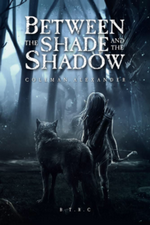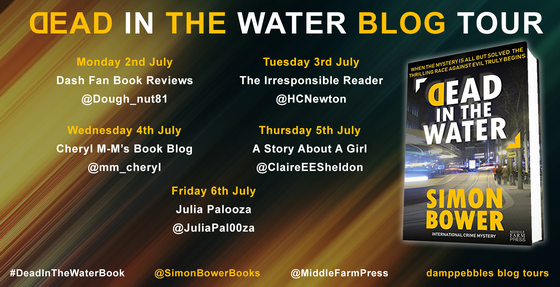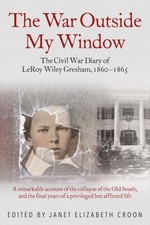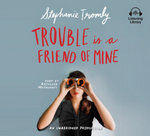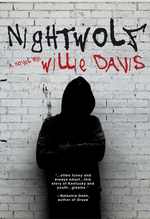 Nightwolf
Nightwolf
by Willie Davis
Kindle Edition, 286 pg.
7.13 Books, 2018
Read: July 12 – 16, 2018

The police thought they collared Nightwolf. The newspapers kept cagey about it, saying the cops book a person of interest in a “prolonged vandalism case.” Prolonged vandalism–like the tagger had writers block and agonized for weeks, and then returned to the scene of the crime to erase a comma.
In the first three paragraphs, our narrator, Milo Byers sets the stage and the tone for what is to follow — a killer introductory section that is irreverent (at best, cynical, jaded, and — simultaneously — honestly optimistic.
We are then thrown into a giant mess surrounding the culture of runaways and poor teens in Lexington, KY. Dropouts, petty criminals, not-so-petty criminals with aspirations of greater crimes, drug dealers, addicts, users, the mentally ill, the ignored, the abused, and their friends create an interesting cultural web for Milo and his associates to move in. At this time, I’m not sure Milo actually has any friends (at least not to his knowledge), but he is constantly surrounded by people.
Milo’s not technically a runaway — he goes home to his mother frequently, but his mother’s dealing with dementia and other problems, so Milo’s practically orphaned. He had (has?) an older brother who left home a few years before, and no one’s heard from him since. Theoretically, that’s why Milo spends time with some of the criminal class — they knew his brother, and he’s sure that he’ll get a clue if he just hangs around enough.
Also running around the city is Nightwolf. He’s a graffiti artist who dabbles in vigilantism (and not wholly successfully) — a folk hero of sorts. For reasons I’ll let Milo explain, he’s got a theory that Nightwolf is his brother. Now he just needs to meet him to unmask him, hopefully finding his brother — and everything will make sense for him. Despite the book’s title, Nightwolf is a relatively minor character — but his presence (or lack thereof) hovers over just about everything we see Milo do.
Now, all this time — I don’t like Milo. He’s not got a lot going for him as a character, he’s a weasel, he lies to himself and everyone else in his life constantly (and frequently without reason) — it’s not that he’s a criminal, there’s at least something defining the character then. I just didn’t care about him, or about what happened to him. Honestly, he’s the best of the bunch — among this cast of characters he’s the most sympathetic, the most reliable, and the most tolerable. Frankly, I spent a lot of time wondering just what the point of this book was — I didn’t dislike the book, just everyone in it and just about everything they did.
(Small spoiler) Now, at 60% there’s a pretty big time jump. I was totally unprepared for that — and enjoyed someone saying, “Time moves too fast” two chapters later. I was initially annoyed because in many ways this jump ended things before I was ready for them to be ended. But it didn’t take me too long to figure out that pretty much everything before was setting the stage for Part Two. Yes, you could argue that sixty percent of a novel is too long to spend on the introduction — and typically you’d be right. But Davis makes it work. The characters have matured enough, have enough distance from the acts of the first part, and have seen what’s happened since then to those involved, etc. The last forty percent of the novel worked for me in ways that the first didn’t, but it wouldn’t have been able to without the foundation laid.
Whenever I’d brush up against “Southern” fiction in my lit classes in college — those stories/novels became my favorite in the course, and I’ve often intended on taking a year or so to do some sort of deep dive into that tradition — but I haven’t gotten around to it. I should see if there’s an iTunesU (or equivalent) covering that. Anyway, I’ve gotten distracted here. My point is that I can see a direct line from Faulkner and Flannery O’Connor to Willie Davis — particularly the latter. She’d be disappointed in Davis’ attitude toward religion, I think, but she’d note a kindred spirit, I think. That should give you a spirit of the flavor of the novel — agnostic, 21st century O’Connor-ish.
Better yet? Davis has the talent to pull that off. Even when I didn’t like the characters (and I mean “actively disliked” not “didn’t appreciate yet”) and wasn’t sure I wanted to know more about what was happening to them — I could not stop reading the writing. When I didn’t mind the characters and felt a certain apathy toward the plot, I couldn’t stop reading the writing. When I sorta kinda maybe liked one or two of the characters and was curious where things were going — I could not stop reading Davis’ writing. I think you get what I’m saying here. Davis’ writing is worth the hassle. I’m not going to try to explain it really — I don’t think I could. Just go with me on this. At the 9% mark, my notes read “horribly ugly world — beautiful prose.”
The book is funny (not really because of events, it’s largely in the narration), sad, thoughtful, mournful, provocative, visceral, offensive and strange (in the most positive sense of the word). It’s not one for a quick casual read, but will reward the effort. For most of the book — and maybe even now (I’m unconvinced) — I didn’t care what happened, ultimately, I just wanted to see what Davis would do with ideas and language (not that I wasn’t ultimately pulling for a few things to happen plot-wise). I’m not wholly satisfied with the novel — not that I can fully articulate why (beyond really not liking anyone or what they were doing for most of the book) but I have a nagging suspicion that the problems are within me, not the text. I will be keeping an eye out for Davis in the future, and suggest you do the same — but read Nightwolf first.
Disclaimer: I received a copy of this novel from the author in exchange for my honest opinion and this post.
—–









 Read a book written by an author from the state where you grew up.
Read a book written by an author from the state where you grew up.
